Student Blog
Diversity
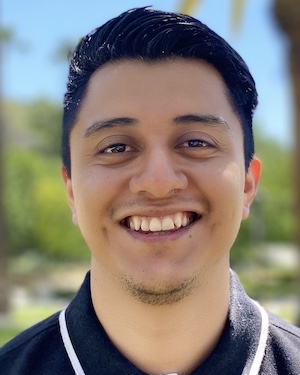
My Support System ⟩
October 26, 2020, by Daniel
Diversity Life Hacks
This past week I received the best news ever, “WE” passed the NBCOT exam! The reason I say “WE” is because I attribute every big accomplishment to my support system. Yes, they will always say that I’m the one that put in the work but I feel that my accomplishments are and always will be a collective effort. Where I come from, it often takes a village to do what very few have done before. This past weekend made me reflect back on my support system and their unconditional love and support. I have been fortunate to have people in my corner every step of the way. Being the first person in my family to go to college came with a set of challenges that at times felt unmanageable. From thinking college wasn’t an option in high school to now being in the OTD Program it has been a long journey to say the least. Last Wednesday, when I opened that email with the NBCOT score, I felt a sense of relief as well as gratitude because I know what it took for me to get here, to be one huge step closer to being a fully licensed OT. This is much bigger than me because it goes back to the hardships my parents and my community have faced.
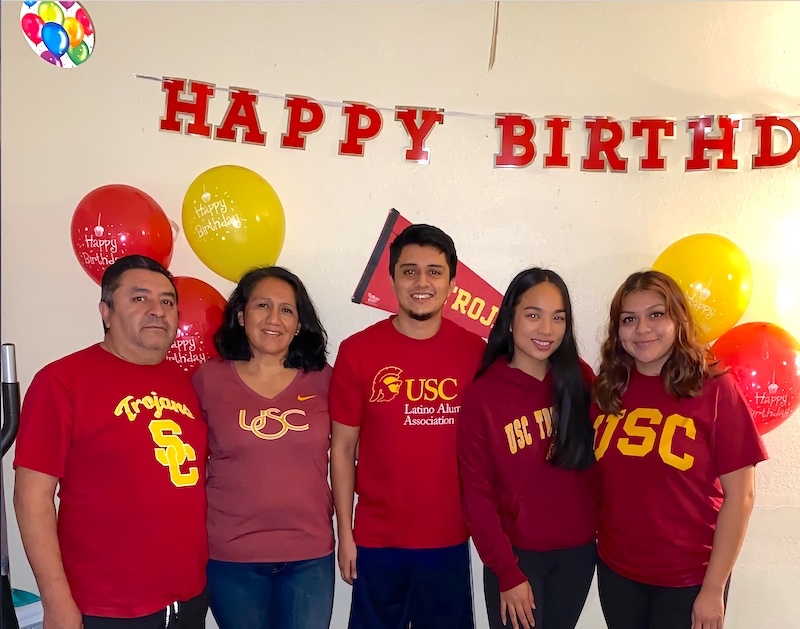
There have been moments in the last couple weeks when I felt defeated while taking classes, completing my residency, going through life, and studying for the NBCOT. It is in these moments that it helps to lean on your support system. Whether that is your family, significant other, friends, classmates, mentors, school organization, etc., it is good to know that there is someone there for you. Having people checking in on me, giving me good vibes, and understanding that I had to spend almost every day studying helped me get closer to the finish line. Sometimes a quick encouraging text can go a long way for someone. And I think this has been the theme of my entire college career, having people that cared enough to make sure I was doing okay mentally, emotionally, and physically. Today I want to simply thank every single person that has made an impact on my journey. The list is too big to add on here today but you know who you are.
This year has been such a unique year as we had to completely change our lives. It has been a year of ups and downs, and times full of uncertainty. All of this plus the responsibilities we still have on a daily basis can make anyone feel overwhelmed. If you ever feel like you are just drowning in school work and other responsibilities, take a moment to reflect on how far you have come. Remember those long nights when you used to have conversations with your loved ones about going to OT school and now you’re here. Hold on to those moments and use them when times get tough. When things don’t go your way, take time to feel those emotions, heal, and when you’re ready get back to it because there is always more than one path. Know that regardless of the outcome your support system, your village, your people, will be there to help you get back on your feet. They will not judge you, and instead will respect you and care for you. Now more than ever it is important to stay connected to your support system. Spend time with those people, whether that is in person, FaceTime, Zoom, whatever way you can. One thing I have learned is that accomplishments always feel best when you can share them with the people that were there along the way. Lastly, take all those lessons you learned along the way and support others.
⋯
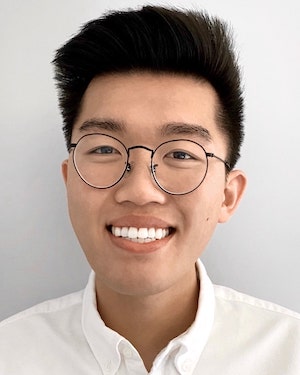
Humans of USC Chan Volume 1 ⟩
September 21, 2020, by Calvin
Classes Diversity Videos What are OS/OT?
When I was applying to OT school, I remember that I really wanted to get different student perspectives on what programs were like and how they navigated graduate school. As a student ambassador, I feel so lucky to have the opportunity to share my experiences with all of you, but I know that there are so many other extraordinary voices in the division too!
So, I gathered some second-year Entry-Level Master’s students to come and talk about what their OT school experiences have been like so far! We went over topics related to what kind of OT they’re interested in, what their favorite classes and memories are, and what challenges they’ve faced. They even shared some advice for all of you thinking about applying to the program! If you watch it through YouTube, the video is time-stamped with each topic in case you ever want to go back to a specific conversation.
I hope you find this video helpful and that these diverse perspectives give you more insight into what student life is like in the Master’s program! Welcome to the Humans of USC Chan!
⋯
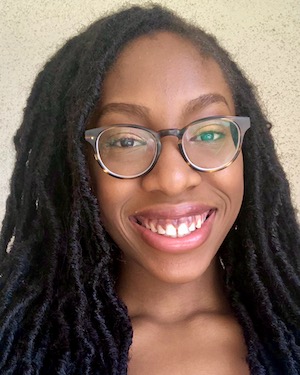
Let’s Talk About Mental Health! ⟩
July 16, 2020, by Nmachi
Diversity Life Hacks
As you may or may not know, July is BIPOC Mental Health Month! This month is dedicated to recognizing the specific struggles that Black, Indigenous, and People of Color face regarding mental health.
Personally, BIPOC mental health means taking the time to recognize that prioritizing my mental health is just as (or even more so) important as all the other goals in my life. Growing up in an immigrant household, I was told from a young age that I was to do my best in school and be the best person I could be so that I could make my family proud. Even though this notion is very much still important to me, I had to learn on my own that mental health is just as important as physical health and should be placed at a higher value in my life. Throughout my middle school and high school years, I was faced with the dilemma of consistently getting straight A’s in my classes or putting my mental health first. I know that a lot of people in my community, especially those from immigrant households, are faced with this issue constantly. The biggest thing I’ve learned overtime is that in order to succeed in all areas of my life, it is crucial that I spend time with myself and learn about things I need to do daily to relieve unnecessary stress and anxiety.
Another key reason why July is recognized as BIPOC Mental Health Month is because of the unique type of trauma that the people of this community may face: racial trauma. Racial trauma, or race-based traumatic stress, refers to how racial biases and discrimination can affect mental health. I would highly suggest reading more about this here.
With all of this being said, there are many things that I do to cope with feelings of self-doubt and unhealthy perfectionism. Here are a few occupations that help me alleviate stressors in my daily life:
Consuming music regularly
Music is a form of therapy in my life. Whenever I feel overwhelmed for whatever reason (academic/personal stress) I continue to turn toward all forms of enjoying the beauty of music. Playing acoustic guitar, singing, and dancing to music are ways that I deal with my positive and negative emotions that naturally come and go.
Speaking with people I trust about my struggles
I find that expressing what I’m feeling and discovering the reasons why I am feeling that way is crucial when attempting to resolve inner conflicts. Thankfully, I was able to find those people who I can confide in and who will keep me accountable at USC. Having a strong support system outside of my family was very important to me. I am forever grateful to those friends, who I now call family, that continue to be there for me and understand my unique struggles as a young Black woman.
Daily affirmations
I started to incorporate affirmations into my daily routine fairly recently. As I began to make reading affirmations a habit, I noticed a difference in the way I view myself as an individual. When I would consistently tell myself that I am worthy of love and happiness, it allowed me to not let the negative thoughts and comments of others truly affect me. Don’t get me wrong, not giving in to others’ predisposed thoughts about me as a Black woman is a daily battle. It is very difficult to maintain confidence in who you are as a person when society and peers overlook you and your community all the time! Despite this, I know now that I don’t need to feel like I have to prove myself to everyone. I don’t need to be perfect. I am perfectly fine right now, just as I am.
⋯
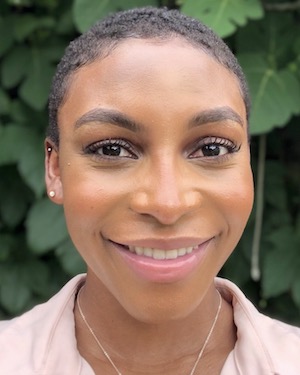
Defeating the Feelings of Inadequacy and Non-belonging ⟩
July 2, 2020, by Lamoni
Diversity Life Hacks
Yesterday, I presented at the student organization fair to give students some information about COTAD. When we, the presenters, were introduced, Dr. Rafeedie referred to us as “second year students.” I am still shocked every time that I hear that phrase. It has already been a full year of graduate school. Am I really half-way done? This question made me think about how I got to this point and all of the feelings of inadequacy that I had to tackle along the way.
The doubts started when I first began my pursuit of higher education. Before my first day of college, I was eager to attend a highly ranked school. I wanted to be challenged. But when I arrived, I was challenged in more ways than one. No one there looked like me. The number of Black students was roughly 5%. And of those Black students, even less were African American. And of those African Americans, few came from low socioeconomic backgrounds. Naturally, I felt out of place due to my race, ethnicity, and income. Along with sharing a class with people from some of the best private high schools in America, I recall questioning my belonging at least several times a week. I do not remember telling anyone about these feelings. My best friend in college was Black but she was not African American and her education was completely paid for by her family. My college was private and very expensive by the way. So, I did not think she would understand. I thought about calling my best friend from high school but she decided not to attend college and was starting a family. She would not understand either. Instead, I pushed those thoughts deep down inside and trucked along. When I graduated, it was the biggest accomplishment of my life. I was so proud! My family was proud! My community was proud!
After college, I knew that I wanted to become an occupational therapist. That, of course, meant going to graduate school. Like I did for college, I traveled across the nation to attend graduate school. I had no family or friends with me. I was starting anew. However, I had already done this once. It would be easier this time. Not so much. Very quickly, the feelings of inadequacy came back. As I walked down the hallways of Chan, I saw portraits of influential women in occupational therapy. Not one portrait was of a Black woman. When we entered the large G37 lecture room, I continued my search for other people that looked like me. I found two. As a class of 144 people, this meant that Black students made up 2%. Truthfully, it was not surprising. Though half of African Americans attend college, according to the National Black Occupational Therapy Caucus, only half of that percentage graduates. According to AOTA’s workforce data from 2014, the percentage of Black occupational therapists is only 4%. With these statistics, it began to feel like this was not the right place for me. But there was a turning point.
During our first summer of the program, we had the honor of receiving a lecture from Dr. Lela Llorens. At our lecture, she spoke about her challenges as a Black occupational therapist and her own feelings of non-belonging. Without knowing, she validated my emotions. Despite her feelings of estrangement, Dr. Llorens greatly influenced our profession’s body of knowledge. In 1969, she received the Eleanor Clarke Slagle Lectureship award — one of the greatest recognitions an occupational therapist can obtain. Additionally, in celebration of occupational therapy’s 100 year history, Dr. Llorens was recognized in AOTA’s list of 100 influential People. Hearing about her achievements dismantled all of my negative thoughts. I have come this far, and I will keep going. Maybe this place was not originally designed for me but there is space for me now. There is space here for others like me, too.
Here are my suggestions for when you feel like you are inadequate or do not belong:
You have jumped over hurdles and navigated barriers time and time again. That is no easy feat! Whether you are just now entering college, finishing college, starting your masters, or completing your OTD, your accomplishments thus far show that you are capable.
When there is already a feeling of non-belonging, it is easy to focus on the negatives. It can send you into a spiral of emphasizing your “failures.” Instead, view everything as a learning tool. If it did not work in the past, what can you do differently? And if it did work, celebrate! Reward yourself! Break the cycle of dismissing validation.
Create a detailed image that affirms your desired outcomes. See the bigger picture. When we have a concrete idea of what we are working toward, we stay motivated. Small rocks in our path may make us stumble but never fall. Do not lose sight of the ultimate goal.
Just like I belong here, so do you.
⋯

How to be an Ally ⟩
June 12, 2020, by Lamoni
Diversity
With the world’s recent affairs, there’s been a lot of discussion about police brutality, the Black Lives Matter movement, misuse of power, the meaning behind certain symbols such as the confederate flag, etc. With these discussions circulating, I have seen a number of well-intentioned acts of solidarity. I have also seen acts that are inappropriate.
In our profession, it is important to build trust with our team and our clients. An important way to build trust is by consistently showing that we are allies, people that care about the same cause and act toward the same goal. It sounds rather simple, but it requires a lot of effort. Right now, your Black friends, classmates, faculty, and staff need to see that effort. And we need it to be vigorous and constant. That being said, I have decided to lay out some points about what it means to be an ally.
What is allyship?
1. Listening more and speaking less
What you’ve learned through books, articles, and observation does not and will not equate to the lived experience. Therefore, it is absolutely necessary to spend most of your time listening rather than speaking. There is always room to learn more.
2. Acknowledging your privilege
You cannot call for equality without first acknowledging that there is an imbalance. Recognize that you have certain advantages that others do not. Use that advantage to amplify the voices of those unheard.
3. Accepting criticism
People tend to immediately begin defending themselves when they are criticized. That can lead to a missed opportunity. Criticism is a form of feedback that should be used to reflect and grow. Embrace it.
What allyship is not
Allyship is not rooted in performance. Lately, it seems that calling oneself an ally is very on-trend. However, as stated, allyship is a lifelong process. It requires consistency in reflection, learning, and action. Expecting awards and recognition suggests that you are conveniently presenting as an ally or have an ulterior motive. Next time you create a #BLM post, ask yourself, “am I doing this for an applause?” and, “if people ask about this post, will I be able to say that I’ve put action behind my words?” (e.g. marched in protests, signed petitions, called legislators).
Being an ally is hard work. Confronting your implicit biases, speaking up when a family member says something ignorant, and recognizing the ways that you participate in oppressive systems is difficult. However, it is necessary. If you do not feel uncomfortable or challenged, you are not actively doing your part.
We have a beautiful profession where we get to advocate for others. Let’s all start now.
⋯





